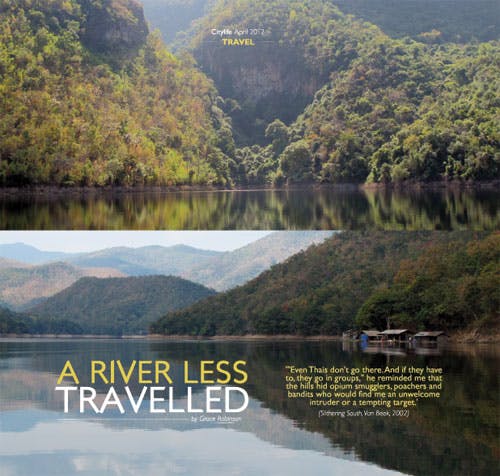
If you like clean, cool fresh mountain air, trails to trek, mountain bikes to ride, flowers of all colours for the bees, and bees for the flowers and cacti of dizzying heights…if you find rock gardens enchanting and waterfalls relaxing and bonsai trees perplexing, this mountain paradise is for you. The loud chorus of birdsong is deafening and the laughter of children thrilling and the Thai cuisine you will find is scrumdiddilyumpshus. There are bugs that are well camouflaged and bugs that like to show off their armor and butterflies as large as dinner plates that seem to float in the breezes, but most importantly there is everything you need for a well-earned retreat. The name of that mountain is called as Doi Angkhang.
You need not hire a tour guide, you need not hire a car, and you need not go with a group of wide-eyed tourists in a special exclusive package. You can do it by yourselves. You will need a smile and learn two words Doi Angkang. First, go to the Chang Peuk ‘satani rot khon song’ (that means bus terminal) then pay 75 baht and in 3 hours the conductor’s assistant will let you know that you have arrived. From the main highway, you need to take another songtaew, which, depending on the number of people, will determine the cost. The less people, the more you pay, or you can wait until more people show up, and wait…and wait…and wait. It’s fun, it’s Thailand, you are on holiday, slow down, mix and mingle, eat something strange, laugh in the sunshine…and wait.
Doi Angkhang is famous for the Royal Agricultural Projects and is a must to visit while in the area. Here hilltribe people grow flowers, vegetables, fruits and herb gardens most of which can be purchased right on the premises. In the past, this area was logged and poppies grew for the illicit opium trade. Today you can let your imagination take flight as you hike up mule trails (or ride the beasts of burden) that still lead to the Thai Burma border and visualise how in the past the opium was transported along the very same path that you are trekking upon. This Royal Project focuses on marketing produce that is grown at high altitudes, such as the coffee of Doi Kham, the neighbouring mountain. By working in the project the lives of the hilltribe people have been vastly improved. Through the growth of cash crops, the hilltribe farmers now have a legal source of income and are independent. We came home loaded down with seasonal fruits of avocadoes, sweet strawberries, kiwi fruits, and bags of jiaogulan tea, but the persimmons, apricots, peaches, plums that also grow there were, as yet, not in season.

Then there is the trekking in forests or along the road. To walk to the Thai Burma border is a 12 kilometre hike (return trip) of steep hills, deep valleys and spectacular viewpoints. Along the way there are hilltribe villages you can visit and purchase handicrafts, or take photos. The area has truly spectacular viewpoints, some standing over 1,900 metres above sea level and no matter what time of day, misty mysterious mornings, sunny shimmering mature days, or muted evening landscape scenes, the views are reminiscent of paintings done by a master’s stroke. Biking would be very arduous and when we wanted to rent a mountain bike to go to the border we were told, “cannot, too steep”, so we walked, huff huff puff puff as the cool mountain air dried our faces. This area has been recognised as a bird watchers paradise, and we were entertained by twitters of unseen birds, their trebles vibrantly emanating from the shadows of forests around us. This area with trekking, bird-watching, mountain biking, exploring, mule riding or just plain dreaming is perfect for nature lovers or just plain lovers.
Accommodations abound. There is the established Amari Doi Angkhang Nature Resort (see their website) as well as a variety of newly opened guesthouses. However, there is a drawback if you come on your own. It was difficult for us to find a songtaew to get back to the main highway. Yes, we waited and waited, ate strange looking food, drank sweetened drinks and no songtaew appeared. Then, after waiting for more than two hours, a couple of kind hearted young men offered to take us to the main road, a distance of 25 kilometres for the price of 400 baht for the both of us, a bargain since the Doi Angkhang Nature Resort charges 700 baht for the trip back as would an empty songtaew. You have to have time to do a trip off the beaten track and patience with a healthy splash of ‘mai pen rai’.

